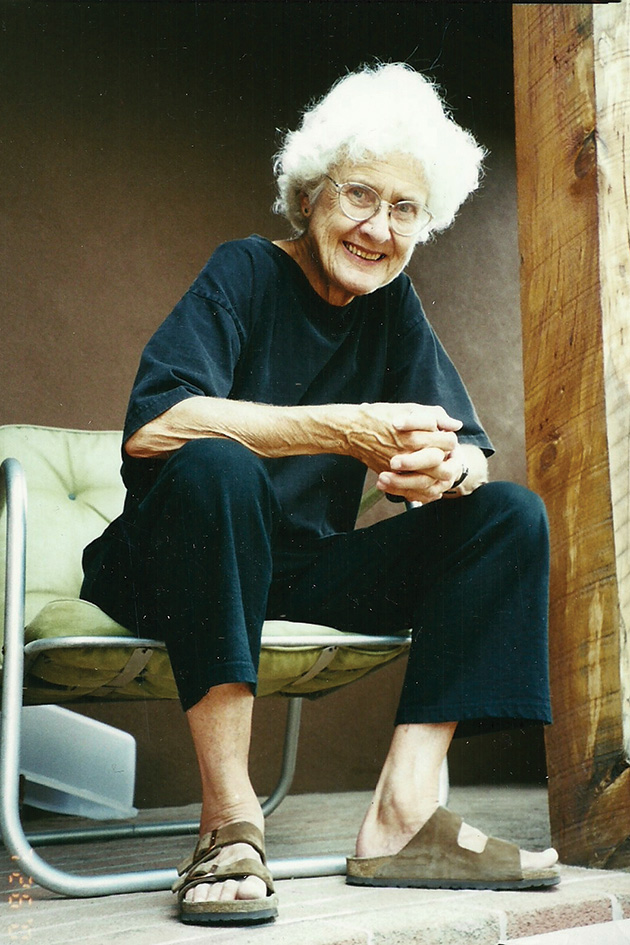Patricia Towne Jahoda ’50

Patricia Marie Towne was born in Helena, Montana, a few hours from Kalispell, where the family finally settled. The Townes were of old American stock, able to trace their family back to the early Puritan arrivals in Massachusetts. Pat was the first child of Dr. Ralph and Marie Towne; her sister Paula would follow some eight years later.
Ralph made his career as a doctor in Kalispell, a town in the Flathead Valley, where Pat developed her enduring passion for the outdoors. She learned to ski with her father and rode horses as well. Marie had high aspirations for her daughters and wanted them to receive a better education than the public schools could provide. When Pat was a teenager, she was sent to a boarding school in Walla Walla, Washington. She went to Mount Holyoke College in Massachusetts for two years and then completed her undergraduate education at Reed. She wrote her thesis, “A Study of Enzyme Action with Particular Reference to Amylolytic Action in Several Vegetables,” advised by Prof. George Livingston [biology 1948–50].
Pat’s lifelong self-sufficiency was born as she learned to fend for herself far from home. She decided to pursue a career in nursing, and while studying at Cornell University, she met Franz Jahoda, a graduate student in physics whose family had fled the Nazis in Austria and found refuge in the United States.
Pat and Franz wed in Ithaca in 1955, and two years later Franz received a job offer at the Los Alamos Scientific Laboratory in New Mexico. Their children, Keith and Ellen, were born in Los Alamos, and northern New Mexico would be Pat and Franz’s beloved home for the rest of their lives. Pat was a fully engaged mom, cooking healthy food before our current consciousness of nutritional health, reading endlessly to her children, making Halloween costumes, and taking picnics into Bandelier National Monument and down to the Rio Grande.
Outside the home Pat was a quiet activist who put her principles into action. She organized and led the local chapter of Zero Population Growth, an environmental group focusing on the demands of increasing population. A lifelong environmentalist, she organized the first Earth Day celebration in Los Alamos in 1970. When she was ready to reenter the workforce, she took a position as a public health nurse for family planning in Rio Arriba County, and would make the rounds of the clinics in that mostly Spanish-speaking county. The job let her address her concerns about family planning and reach across the class and language barriers of New Mexico, of which she was acutely aware.
In 1980, Pat and Franz moved to Santa Fe, where Pat applied herself in new civic directions. Her nephew had an autism spectrum disorder, and Pat observed her sister’s tremendous efforts to support her son’s extensive needs for care. Aware of the struggles faced by the mentally ill and their families, she became director of the New Mexico chapter of the National Alliance for the Mentally Ill (NAMI), lobbied in the state capital, and worked with Senator Pete Domenici to secure funding for initiatives to assist the mentally ill in New Mexico. Among her many accomplishments in this role, Pat created a handbook for assisting the mentally ill.
After retiring, she remained involved; joining the board of the Big Brothers/Big Sisters organization in northern New Mexico. As with her work at NAMI, Pat chose to support and nurture an organization that improved lives of at-risk youth, one at a time. She was a lifelong supporter of Reed College.
The family was passionate about the outdoors, and weekends were filled with skiing, backpacking, and hikes. Pat and Franz traveled with Earthwatch to monitor sea turtles in the South Pacific, bushwhacked across Baranof Island, hiked in the Dolomites, scuba dived in the Great Barrier Reef, and traveled to Patagonia. The wonder of solar eclipses entranced them, and they made 11 trips to witness eclipses all over the world, including Mongolia, Egypt, Turkey, Zambia, and the Galapagos Islands.
Pat’s final wish was that her family have the opportunity to witness a solar eclipse. She made arrangements so that her children and their families would be able to witness the total eclipse on August 21, 2017, in the United States. Her own stamina gave way and she was unable to join her family for the adventure. Three days after the eclipse, Pat suffered a stroke, and death followed in November. She is survived by her son, Keith Jahoda, and her daughter, Ellen Jahoda.
Appeared in Reed magazine: June 2018
comments powered by Disqus


![Photo of Prof. Marvin Levich [philosophy 1953–94]](https://www.reed.edu/reed-magazine/in-memoriam/assets/images/2022/LTL-levich1.jpg)
![Photo of President Paul E. Bragdon [1971–88]](https://www.reed.edu/reed-magazine/in-memoriam/assets/images/2020/Bragdon.jpg)
![Photo of Prof. Edward Barton Segel [history 1973–2011]](https://www.reed.edu/reed-magazine/in-memoriam/assets/images/2020/Segel.jpg)








































































